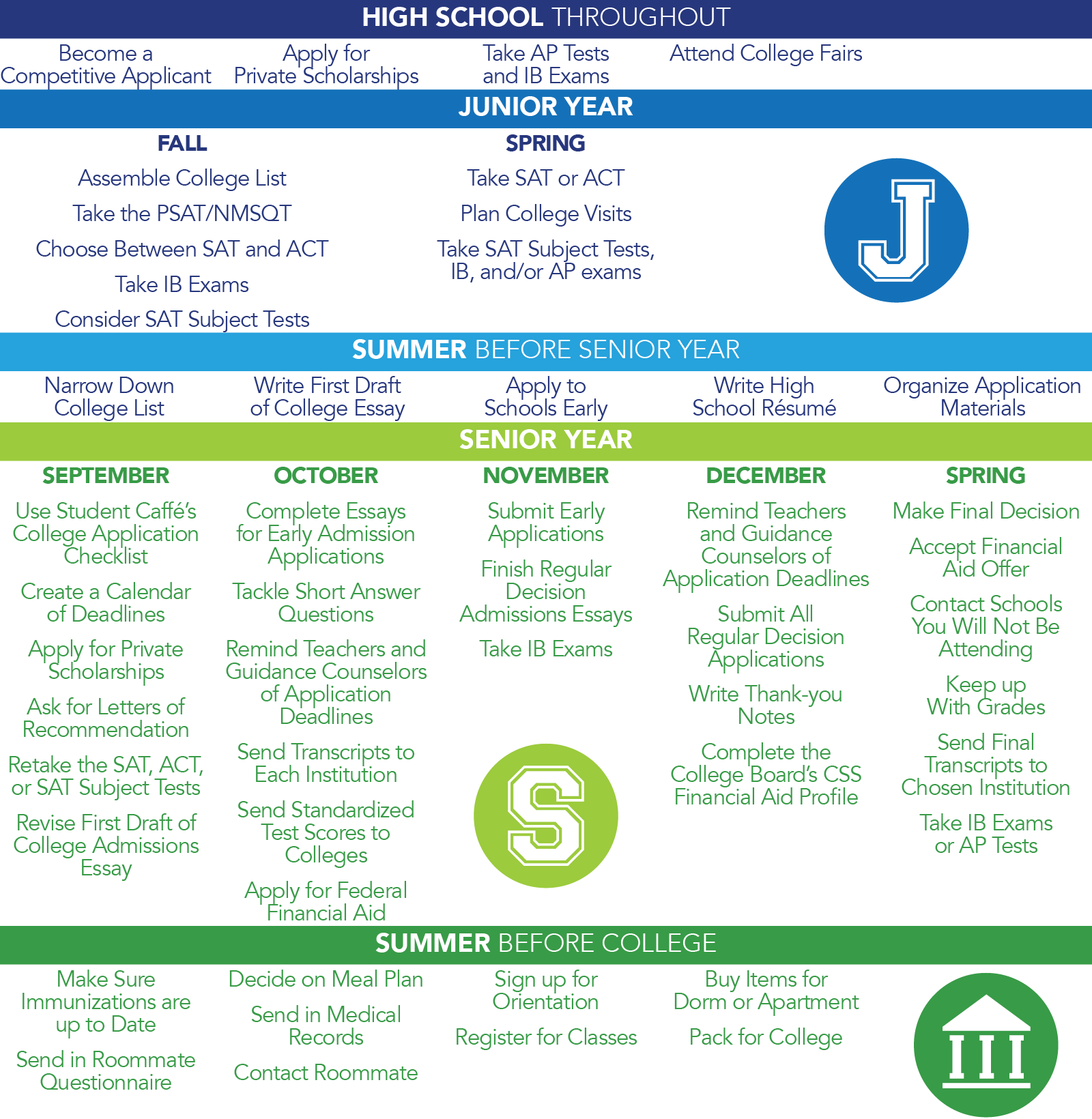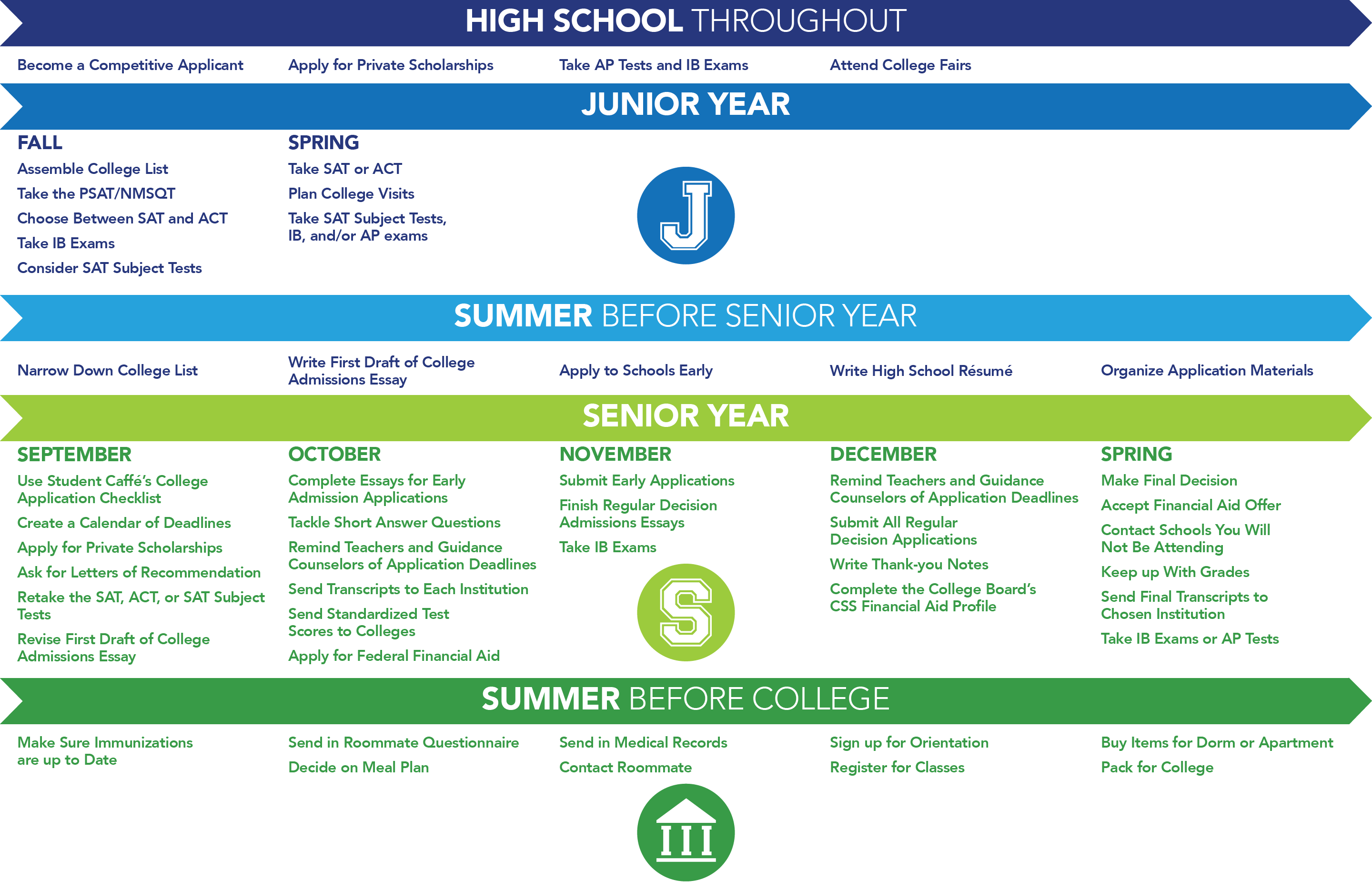This section provides a timeline for thinking about college admissions and completing your college applications. It recommends actions you can take each year of high school to ensure you are a competitive applicant when it comes time to submit your application to a four-year institution. All steps are assembled in chronological order. Get started early and follow the timeline so that you’re less stressed come crunch time senior year. Download the printable College Admissions Timeline if you prefer to take notes and check things off as you go. Good luck!
Explore the graphic below to get a general idea of your timeline. If you're looking for more detailed information or links to relevant articles, refer to the text below the graphic.



Throughout High School:
- Become a competitive applicant.
- Get to know your guidance counselor.
- Take challenging courses.
- Learn a language.
- Get involved in extracurricular activities.
- Serve your community.
- Make your summers meaningful.
- Read in your spare time.
- Attend college fairs.
- The National Association for Colleges Admissions Counseling hosts events at conference and community centers throughout the United States. There are three types of college fairs for students with differing interests:
- National College Fairs
- Science, Technology, Engineering, and Math (STEM) College Fairs
- Performing and Visual Arts College Fairs
- Your high school may also host fairs; check with your guidance counselor.
- The National Association for Colleges Admissions Counseling hosts events at conference and community centers throughout the United States. There are three types of college fairs for students with differing interests:
- Research and apply for private scholarships that can cut your future college costs.
- Take AP tests in May of each academic year.
- Take IB exams in November or May junior and senior year.
Junior Year – Fall Semester:
- Begin assembling your college list.
- Identify your college preferences.
- Find the right academic fit.
- Find the right financial fit.
- Take the PSAT/NMSQT.
- Determine whether you will take the SAT or the ACT.
- Take IB exams.
- Consider taking SAT Subject Tests.
Junior Year – Spring Semester:
- Register and take the SAT or the ACT.
- Plan college visits.
- Call ahead to potential schools to schedule visits.
- Plan to stay overnight with a student, if possible.
- Meet with an admissions counselor at each institution.
- Sit in on classes and meet with faculty or students from your potential department.
- Ask current students for real answers about student life.
- Register and take SAT Subject Tests, IB exams, and/or AP exams.
Summer Before Senior Year:
- Narrow down your college list.
- Decide if you want to apply early to any schools.
- Write your high school résumé.
- Determine if your school uses an application platform or if you must apply through the institution.
- Begin gathering your application materials.
- Write the first draft of your college admissions essay.
Senior Year – September:
- Use Student Caffé’s College Application Checklist to keep track of deadlines and requirements for each school.
- Create a master calendar of deadlines for all institutions to which you are applying. Include:
- Early and regular decision application deadlines.
- Dates of request for transcripts, test scores, letters of recommendation, and other application materials from your high school.
- Dates of submission of transcripts, test scores, letters of recommendation, and other application materials to each college.
- Deadlines for all necessary financial aid forms (FAFSA, CSS Profile, and any supplements required by the institution).
- Deadlines for institutional and private scholarships.
- Research and apply for private scholarships.
- Ask your counselor and teachers for recommendation letters.
- Open online application accounts or request that hard copies of application materials are sent to you from each school.
- Register to retake the SAT, ACT, or SAT Subject Tests. October is the last month you can take these tests if you need your scores reported before any early application deadlines. For schools where you are applying regular decision, check to see the last test date for which they accept scores. You could potentially retake the tests in November and December.
- Begin revisions on the first draft of your college admissions essay.
Senior Year – October:
- Continue working on essays and finish those for early admission applications by the end of the month.
- Tackle short answer questions.
- Gently remind teachers and guidance counselors of application deadlines if they have not already submitted their recommendations, especially if you have any early admissions applications.
- Have your high school send your transcripts to each institution.
- Send standardized test scores to colleges.
- Request an application fee waiver from your guidance counselor if you qualify. The form and information can be found here.
- Apply for federal financial aid.
Senior Year – November:
- Submit early applications by posted deadlines. Generally, these are on November 1st or 15th.
- Put the finishing touches on any regular decision admissions essays.
- Take IB exams.
Senior Year – December:
- If necessary, gently remind teachers and guidance counselors of application deadlines again. It is your responsibility to make sure everything is submitted by the posted due dates.
- Complete and submit all regular decision applications.
- Write thank-you notes to teachers and counselors after they submit recommendations.
- Complete the College Board’s CSS Financial Aid Profile if it is required by your institution.
Senior Year – Spring Semester:
- Make your final decision.
- Consider any waitlist offers.
- Compare acceptance offers.
- Send in your deposit by the national deadline of May 1st.
- Accept your financial aid offer.
- Accept or deny a work-study award.
- Determine if you will need to take out private loans.
- Contact the schools you will not be attending.
- Keep up your grades.
- Send your final transcripts to your chosen institution.
- Take IB exams or AP tests.
Summer Before College:
- Fill out and send in your roommate questionnaire for on-campus housing or secure off-campus housing.
- Decide on a meal plan.
- Make sure your immunizations are up to date.
- Send in your medical records.
- Contact your roommate.
- Sign up for orientation.
- Register for classes.
- Buy items for your dorm room or apartment.
- Pack for college.
- Enjoy your summer!
Page last updated: 05/2019


